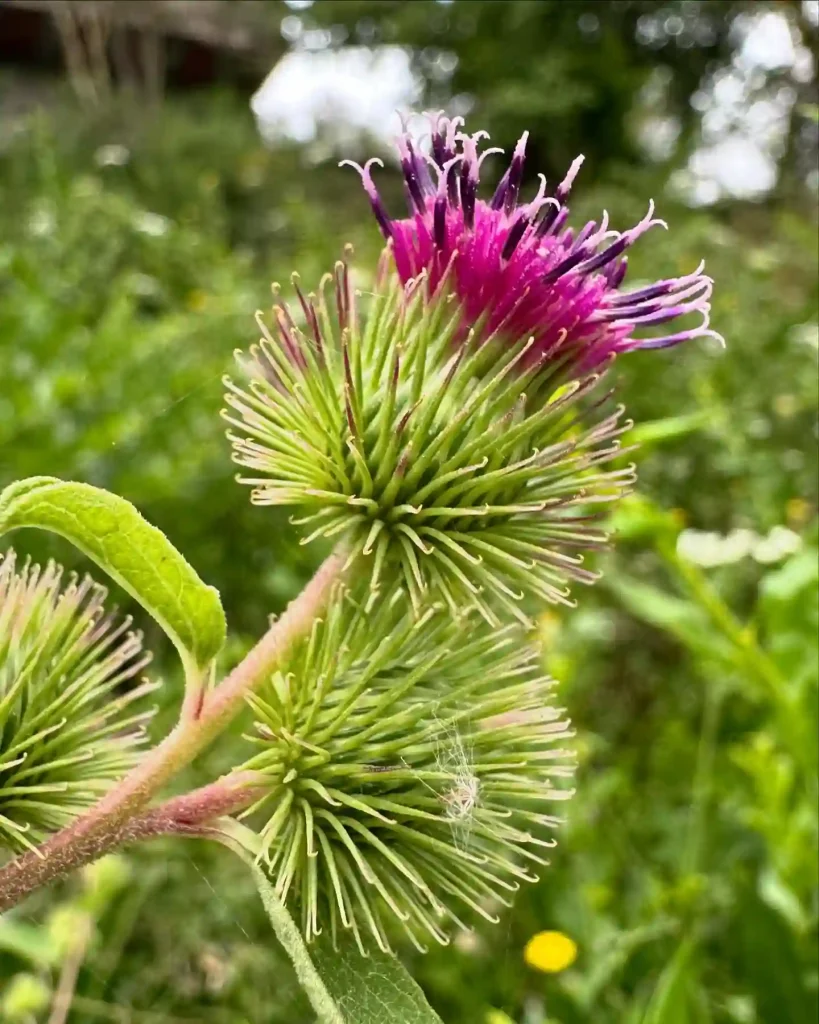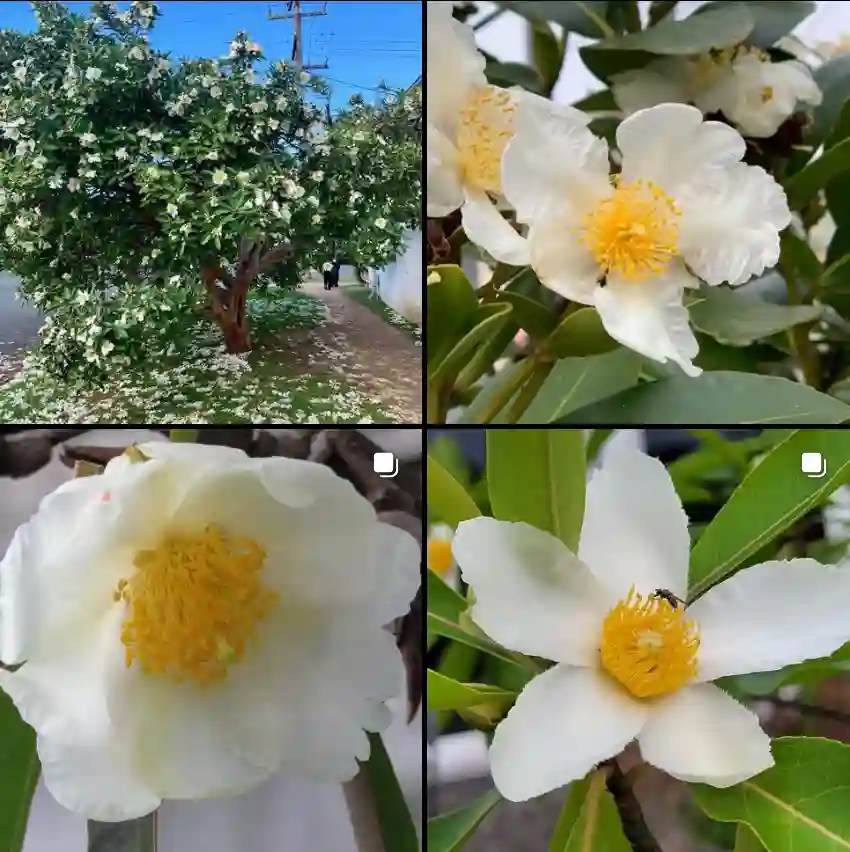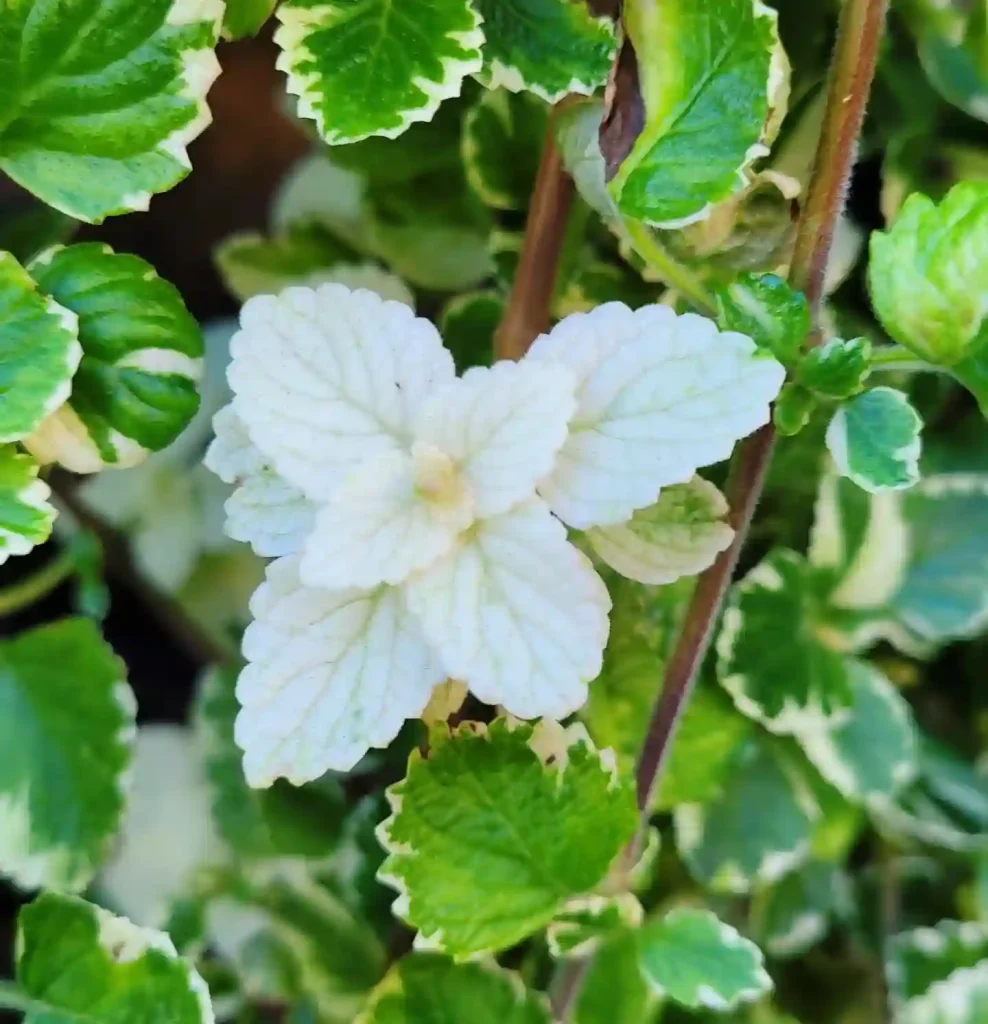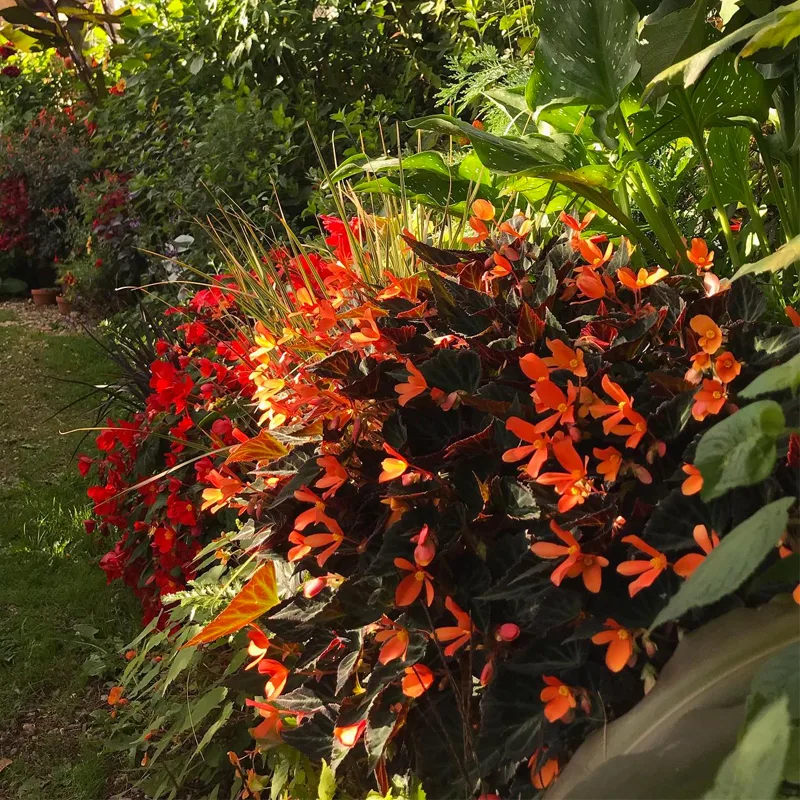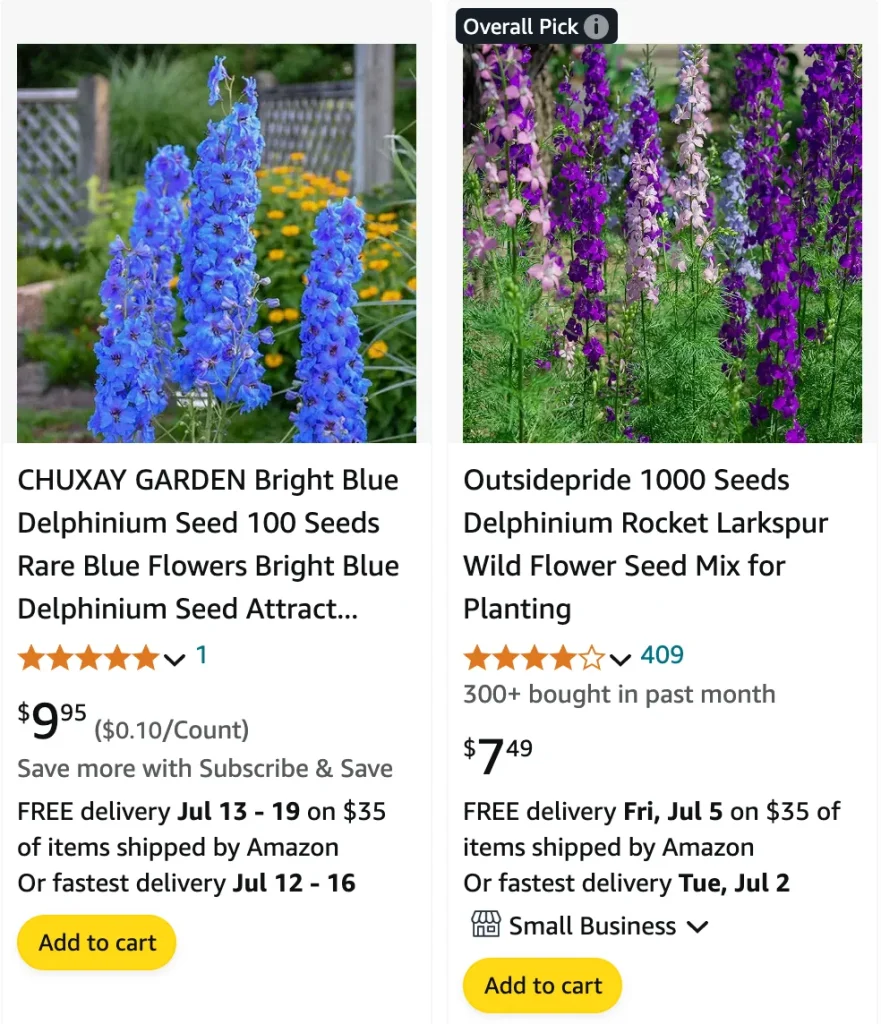
Delphinium: The Towering Beauty with a Touch of Mystery
As a gardener with a penchant for the dramatic, delphiniums have always held a special place in my heart. These majestic perennials, with their towering flower spikes and vibrant blooms, add a touch of grandeur to any border. But along with their undeniable beauty comes a shroud of mystery. Are they deer-resistant? Can pets safely frolic around them? Here, I delve into the world of delphiniums to answer all your burning questions.
FAQs
What is Larkspur?
Delphinium or Larkspur, is a genus of over 500 annual flowering species belonging to the buttercup family, Ranunculaceae. These delicate plants are known for their tall, spiky clusters of flowers that come in a range of vibrant colors. They add an elegant touch to any garden with their long stems and soft, feathery leaves.
How to Care for Delphinium?
Delphiniums thrive in cool climates with full sun to partial shade. They prefer well-drained, fertile soil with consistent moisture. Regular watering is crucial during the growing season, especially for young plants. To encourage bushier growth and prevent floppy stems, pinch back the growing tips when the plants reach about 12 inches tall. Deadheading spent blooms throughout the summer will promote continued flowering.
Is Larkspur Poisonous?
Yes, Larkspur is highly poisonous to humans and animals if ingested. All parts of the plant contain toxic alkaloids that can cause severe gastrointestinal discomfort, respiratory problems, and even death. It is crucial to handle this plant with care and ensure that it is kept out of reach of children and pets.
Is Larkspur a Perennial?
Larkspur is generally considered an annual plant, completing its life cycle in one growing season. However, some species can behave like short-lived perennials in certain climates, particularly where the winters are mild.
What Color is Larkspur?
Larkspur flowers come in a variety of colors including blue, purple, pink, and white. The most common and popular color is a rich, vibrant blue, which makes a striking addition to any garden.
What Does a Larkspur Look Like?
Larkspur plants are characterized by their tall, slender stems that can reach up to four feet in height. The flowers are arranged in loose, branching spikes, each flower having five petal-like sepals and a spur that gives them their distinctive appearance. The leaves are finely divided and feathery, adding to the plant’s delicate charm.
When Does Larkspur Bloom?
Larkspur typically blooms in late spring to early summer, with flowers appearing from May to July. The exact blooming time can vary depending on the climate and growing conditions.
When to Plant Larkspur Seeds?
Larkspur seeds should be planted in the fall for the best results. They require a period of cold stratification, meaning they need exposure to cold temperatures before they will germinate. Planting the seeds in the fall allows them to undergo this natural process over the winter months.
How to Propagate Larkspur?
Larkspur is most commonly propagated by seed. Collect the seeds from mature plants in the late summer or fall. Store them in a cool, dry place until you’re ready to plant them in the fall. Direct sow the seeds into prepared garden beds and cover lightly with soil.
How Long Do Larkspur Seeds Take to Germinate?
Larkspur seeds generally take about 2 to 3 weeks to germinate, depending on the soil temperature and moisture levels. Cold stratification can help improve germination rates and ensure more uniform growth.
Do Deer Eat Larkspur?
No, deer typically avoid Larkspur due to its toxicity. This makes Larkspur a great choice for gardens in areas where deer are a problem, as it is unlikely to be eaten by them.
Can You Grow Larkspur in Pots?
Yes, you can grow Larkspur in pots. Choose a large, deep container with good drainage, and fill it with a well-draining potting mix. Sow the seeds in the fall, cover lightly with soil, and keep the soil moist. Place the pot in a sunny location and protect it from harsh winter conditions if necessary.
Larkspur vs Lupine
Larkspur and Lupine both have tall flower spikes, but they belong to different plant families. Lupine (Lupinus) is part of the legume family and has flowers that are arranged more tightly on the spike. Additionally, Lupine flowers have a unique pea-like shape, whereas Larkspur flowers are more open and delicate.
Larkspur vs Foxglove
Larkspur and Foxglove (Digitalis) both produce tall, spiky flower clusters, but they differ significantly. Foxglove flowers are tubular and arranged in a more orderly, dense spike, and the plants themselves are biennial or perennial. Larkspur, on the other hand, has more loosely arranged, spurred flowers and is typically an annual.
Larkspur vs Lavender
Larkspur and Lavender (Lavandula) are quite different in terms of appearance and growing requirements. Lavender is a perennial shrub with fragrant, grey-green foliage and spikes of purple flowers. Larkspur, as mentioned, is an annual with tall, slender spikes of flowers in various colors. Lavender prefers dry, well-draining soil and full sun, while Larkspur thrives in cooler, moist conditions.
Larkspur vs Snapdragon
Larkspur and Snapdragon (Antirrhinum) both produce colorful, spiky flowers, but their growth habits and flower structures are different. Snapdragon flowers are more tightly packed and have a distinct, mouth-like shape that gives them their name. Larkspur flowers are more open and delicate. Snapdragons are also typically more compact plants compared to the taller, slender Larkspur.
What to Plant with Larkspur?
Larkspur pairs beautifully with other cottage garden favorites like poppies, foxgloves, and snapdragons. Their tall, spiky form adds height and structure to mixed borders, and their variety of colors can complement a wide range of other flowers. Consider planting them with shorter, mounding plants to create a layered effect in your garden.
Do Bees Like Delphinium?
Yes, bees love delphiniums! The vibrant flowers with their nectar-rich centers are a magnet for pollinators. Planting delphiniums in your garden not only adds beauty but also helps support these vital insects.
Do Hummingbirds Like Delphinium?
While hummingbirds are primarily attracted to brightly colored, trumpet-shaped flowers, some delphinium varieties with open, nectar-rich blooms may also attract these tiny feathered visitors.
Delphinium species
- Delphinium aconiti L.
- Delphinium acutidentatum (W.T.Wang) N.I.Malyutin
- Delphinium adenopodum W.T.Wang & Zong Zong Yang
- Delphinium aemulans Nevski
- Delphinium afghanicum Rech.f.
- Delphinium ajacis L. Plant FAQs: Delphinium Ajacis
- Delphinium alabamicum Kral
- Delphinium albiflorum DC.
- Delphinium albocoeruleum Maxim.
- Delphinium albomarginatum Simonova
- Delphinium alpestre Rydb.
- Delphinium anatolicum H.Misirdali, Malyer & Baser
- Delphinium andersonii A.Gray
- Delphinium andesicola Ewan
- Delphinium angustipaniculatum W.T.Wang
- Delphinium anthoroideum Boiss.
- Delphinium anthriscifolium Hance
- Delphinium antoninum Eastw.
- Delphinium apolanum Starm.
- Delphinium aquilegiifolium (Boiss.) Bornm.
- Delphinium araraticum (N.Busch) N.Busch ex Grossh.
- Delphinium arcuatum N.Busch
- Delphinium arenarium (Carlström) Jabbour
- Delphinium armeniacum Stapf ex Huth
- Delphinium atroviolaceum Luferov
- Delphinium aucheri Boiss.
- Delphinium austriacum (Pawł.) Starm.
- Delphinium austroaltaicum A.L.Ebel
- Delphinium autumnale Hand.-Mazz.
- Delphinium axilliflorum DC.
- Delphinium bakeri Ewan
- Delphinium balansae Boiss. & Reut.
- Delphinium balcanicum Pawł.
- Delphinium barbatum Bunge
- Delphinium barbeyi (Huth) Huth
- Delphinium barlykense Lomon. & Khanm.
- Delphinium barrancae Ewan
- Delphinium barykinae Luferov
- Delphinium batalinii Huth
- Delphinium batangense Finet & Gagnep.
- Delphinium beesianum W.W.Sm.
- Delphinium bhutanicum Munz
- Delphinium bicarpellatum Qureshi & Chaudhri
- Delphinium bicolor Nutt.
- Delphinium bicornutum Hemsl.
- Delphinium biternatum Huth
- Delphinium bolosii C.Blanché & Molero
- Delphinium bovei Decne.
- Delphinium brachycentrum Ledeb.
- Delphinium bracteosum Sommier & Levier
- Delphinium brevicorne Vis.
- Delphinium brevisepalum W.T.Wang
- Delphinium brunonianum Royle
- Delphinium bucharicum Popov
- Delphinium buerjinense W.T.Wang & Zong Zong Yang
- Delphinium bulbilliferum Rech.f.
- Delphinium bulleyanum Forrest ex Diels
- Delphinium × burkei Greene
- Delphinium burmaense Munz
- Delphinium buschianum Grossh.
- Delphinium caeruleum Jacquem. ex Cambess.
- Delphinium calcar-equitis Standl.
- Delphinium californicum Torr. & A.Gray
- Delphinium callichromum Q.L.Gan & Xin W.Li
- Delphinium calophyllum W.T.Wang
- Delphinium camptocarpum Fisch. & C.A.Mey.
- Delphinium campylocentrum Maxim.
- Delphinium cardinale Hook.
- Delphinium carduchorum Chowdhuri & P.H.Davis
- Delphinium carolinianum Walter
- Delphinium cashmerianum Royle
- Delphinium caucasicum C.A.Mey.
- Delphinium caudatolobum W.T.Wang
- Delphinium centeteroides (Brühl) Munz
- Delphinium ceratophoroides W.T.Wang
- Delphinium ceratophorum Franch.
- Delphinium chamissonis Pritz. ex Walp.
- Delphinium changaicum Frizen
- Delphinium changduense W.T.Wang
- Delphinium charadzeae Kem.-Nath. & Gagnidze
- Delphinium chayuense W.T.Wang
- Delphinium cheilanthum Fisch. ex DC.
- Delphinium chodatii Oppenh.
- Delphinium chrysotrichum Finet & Gagnep.
- Delphinium chumulangmaense W.T.Wang
- Delphinium chungbaense W.T.Wang
- Delphinium cilicicum P.H.Davis & Kit Tan
- Delphinium cinereum Boiss.
- Delphinium coelesyriacum (Mouterde) Jabbour
- Delphinium coleopodum Hand.-Mazz.
- Delphinium × confertiflorum Wooton
- Delphinium connectens Pachom.
- Delphinium consolida L. Plant FAQs: Delphinium Consolida
- Delphinium cooperi Munz
- Delphinium cornutum M.Hossain & P.H.Davis
- Delphinium corymbosum Regel
- Delphinium cossonianum Batt.
- Delphinium crassifolium Schrad. ex Spreng.
- Delphinium crispulum Rupr.
- Delphinium cruciatum M.Hossain & P.H.Davis
- Delphinium cuneatum Spreng.
- Delphinium cyananthum Nevski
- Delphinium cyphoplectrum Boiss.
- Delphinium daochengense W.T.Wang
- Delphinium darginicum Dimitrova
- Delphinium dasyanthum Kar. & Kir.
- Delphinium dasycarpum Steven ex DC.
- Delphinium dasycaulon Fresen.
- Delphinium dasystachyon Boiss. & Balansa
- Delphinium davidii Franch.
- Delphinium davisii Munz
- Delphinium dazangense W.T.Wang
- Delphinium decoloratum Ovcz. & Kochk.
- Delphinium decorum Fisch. & C.A.Mey.
- Delphinium delavayi Franch.
- Delphinium densiflorum Duthie ex Huth
- Delphinium denudatum Wall. ex Hook.f. & Thomson
- Delphinium depauperatum Nutt.
- Delphinium deserti-syriaci Zohary
- Delphinium dicentrum W.T.Wang
- Delphinium dictyocarpum DC.
- Delphinium dingjieense W.T.Wang
- Delphinium disjunctum Ewan
- Delphinium dissectum Huth
- Delphinium distichum Geyer ex Hook.
- Delphinium diversifolium Greene
- Delphinium dolichocentroides W.T.Wang
- Delphinium dolichostachyum Chowdhuri & P.H.Davis
- Delphinium drepanocentrum (Brühl ex Huth) Munz
- Delphinium dubium (Rouy & Foucaud) Pawł.
- Delphinium dzavakhischwilii Kem.-Nath.
- Delphinium ecalcaratum S.Y.Wang & K.F.Zhou
- Delphinium edelbergii Rech.f. & Riedl
- Delphinium eglandulosum Chang Y.Yang & B.Wang
- Delphinium elatum L.
- Delphinium elbursense Rech.f.
- Delphinium elisabethae N.Busch
- Delphinium emarginatum C.Presl
- Delphinium eriostylum H.Lév.
- Delphinium erlangshanicum W.T.Wang
- Delphinium exaltatum Aiton
- Delphinium favargeri C.Blanché, Molero & J.Simon
- Delphinium fedorovii Dimitrova
- Delphinium ferganicum Lazkov
- Delphinium filifolium Iranshahr
- Delphinium fissum Waldst. & Kit.
- Delphinium flavum DC.
- Delphinium flexuosum M.Bieb.
- Delphinium foetidum Lomakin
- Delphinium forrestii Diels
- Delphinium furcatocornutum W.T.Wang
- Delphinium geraniifolium Rydb.
- Delphinium geyeri Greene
- Delphinium giraldii Diels
- Delphinium glabricaule W.T.Wang
- Delphinium glaciale Hook.f. & Thomson
- Delphinium glandulosum Boiss. & A.Huet
- Delphinium glareosum Greene
- Delphinium glaucescens Rydb.
- Delphinium glaucum S.Watson
- Delphinium gombaultii J.Thiébaut
- Delphinium gonggaense W.T.Wang
- Delphinium gongliuense W.T.Wang & Zong Zong Yang
- Delphinium gracile DC.
- Delphinium gracilentum Greene
- Delphinium grandiflorum L. Plant FAQs: Delphinium Grandiflorum
- Delphinium griseum Gilli
- Delphinium gubanovii Frizen
- Delphinium gueneri P.H.Davis
- Delphinium gyalanum C.Marquand & Airy Shaw
- Delphinium gypsophilum Ewan
- Delphinium habaheense W.T.Wang & Zong Zong Yang
- Delphinium hajrae Pusalkar
- Delphinium halteratum Sm.
- Delphinium hamatum Franch.
- Delphinium hansenii (Greene) Greene
- Delphinium hellenicum Pawł.
- Delphinium hellesponticum Boiss.
- Delphinium henryi Franch.
- Delphinium heratense Iranshahr
- Delphinium hesperium A.Gray
- Delphinium hillcoatiae Munz
- Delphinium himalayae Munz
- Delphinium hirticaule Franch.
- Delphinium hirtifolium W.T.Wang
- Delphinium hispanicum Willk. ex Costa
- Delphinium hohenackeri Boiss.
- Delphinium honanense W.T.Wang
- Delphinium hsinganense S.H.Li & Z.F.Fang
- Delphinium huangzhongense W.T.Wang
- Delphinium huashanicum W.T.Wang
- Delphinium hueizeense W.T.Wang
- Delphinium huetianum Meikle
- Delphinium hui F.H.Chen
- Delphinium humilius (W.T.Wang) W.T.Wang
- Delphinium hutchinsoniae Ewan
- Delphinium ilgazense P.H.Davis
- Delphinium iliense Huth
- Delphinium imbricatilobum W.T.Wang
- Delphinium incanum E.D.Clarke
- Delphinium incisolobulatum W.T.Wang
- Delphinium incisum (Hook.f. & Thomson) Wall. ex Munz
- Delphinium inconspicuum Serg.
- Delphinium × inflexum Davidson
- Delphinium inopinatum Nevski
- Delphinium inopinum (Jeps.) F.H.Lewis & Epling
- Delphinium iranorum N.Busch
- Delphinium iris Ilarslan & Kit Tan
- Delphinium jacobsii Iranshahr
- Delphinium kabulianum Akhtar
- Delphinium kamaonense Huth
- Delphinium kandaharicum (Iranshahr) Jabbour
- Delphinium kansuense W.T.Wang
- Delphinium kantzeense W.T.Wang
- Delphinium karategini Korsh.
- Delphinium keminense Pachom.
- Delphinium khorasanicum Sharifnia & Hasanbarani
- Delphinium kingianum Brühl ex Huth
- Delphinium kitianum Ilarslan
- Delphinium knorringianum B.Fedtsch.
- Delphinium koelzii Munz
- Delphinium kohatense (Brühl) Munz
- Delphinium kolymense A.P.Khokhr.
- Delphinium × kotulae Pawł.
- Delphinium kurdicum Boiss. & Hohen.
- Delphinium lacei Munz
- Delphinium lacostei Danguy
- Delphinium lagarocentrum W.T.Wang
- Delphinium lagarolobum W.T.Wang
- Delphinium lahulensis P.Agnihotri, T.Husain & D.Husain
- Delphinium lalesaricum Iranshahr
- Delphinium langxianense W.T.Wang
- Delphinium lanigerum Boiss.
- Delphinium lasiantherum W.T.Wang
- Delphinium latirhombicum W.T.Wang
- Delphinium latisepalum Hemsl.
- Delphinium laxicymosum W.T.Wang
- Delphinium laxiflorum DC.
- Delphinium laxiusculum (Boiss.) Rouy
- Delphinium leiophyllum (W.T.Wang) W.T.Wang
- Delphinium leonidae Kem.-Nath.
- Delphinium leptocarpum (Nevski) Nevski
- Delphinium leptophyllum Hemsl.
- Delphinium leroyi Franch. ex Huth
- Delphinium leucophaeum Greene
- Delphinium lihengianum Q.E.Yang & Y.Luo
- Delphinium likiangense Franch.
- Delphinium lilacinum Hand.-Mazz.
- Delphinium linarioides Boiss.
- Delphinium lineapetalum Ewan
- Delphinium linearilobum (Trautv.) N.Busch
- Delphinium lineolatum (Hub.-Mor. & C.Simon) Jabbour
- Delphinium lingbaoense S.Y.Wang & Q.S.Yang
- Delphinium lipskii Korsh.
- Delphinium lithophilum Podlech
- Delphinium lomakinii Kem.-Nath.
- Delphinium longibracteatum (Boiss.) Munz
- Delphinium longibracteolatum W.T.Wang
- Delphinium longipedicellatum W.T.Wang
- Delphinium longipedunculatum Regel & Schmalh.
- Delphinium longziense W.T.Wang
- Delphinium lorestanicum (Iranshahr) Jabbour
- Delphinium ludingense W.T.Wang
- Delphinium ludlowii Munz
- Delphinium luteum A.Heller
- Delphinium maackianum Regel
- Delphinium macedonicum Halácsy & Charrel
- Delphinium macrocentrum Oliv.
- Delphinium macropetalum DC.
- Delphinium macropogon Prokh.
- Delphinium macrostachyum Boiss. ex Huth
- Delphinium maderense C.Blanché
- Delphinium madrense S.Watson
- Delphinium majus (W.T.Wang) W.T.Wang
- Delphinium malabaricum (Huth) Munz
- Delphinium malacophyllum Hand.-Mazz.
- Delphinium malyschevii Frizen
- Delphinium maoxianense W.T.Wang
- Delphinium mariae N.Busch
- Delphinium mauritanicum Coss.
- Delphinium maximowiczii Franch.
- Delphinium medogense W.T.Wang
- Delphinium megalanthum Nevski
- Delphinium menyuyanense W.T.Wang
- Delphinium menziesii DC.
- Delphinium micranthum Boiss. & Hohen.
- Delphinium micropetalum Finet & Gagnep.
- Delphinium middendorffii Trautv.
- Delphinium minutibracteolatum (W.T.Wang) Luferov
- Delphinium mirabile Serg.
- Delphinium molle Danguy
- Delphinium mollifolium W.T.Wang
- Delphinium mollipilum W.T.Wang
- Delphinium monanthum Hand.-Mazz.
- Delphinium monogynum W.T.Wang
- Delphinium montanum DC.
- Delphinium muliense W.T.Wang
- Delphinium multiplex (Ewan) C.L.Hitchc.
- Delphinium munzianum P.H.Davis & Kit Tan
- Delphinium muscosum Exell & Hillc.
- Delphinium nachiczevanicum Tzvelev
- Delphinium nangchienense W.T.Wang
- Delphinium nangziense W.T.Wang
- Delphinium nanum DC.
- Delphinium neowentsaii Chang Y.Yang
- Delphinium nepalense Kitam. & Tamura
- Delphinium newtonianum D.M.Moore
- Delphinium nikitinae Pachom.
- Delphinium nilekeense W.T.Wang & Zong Zong Yang
- Delphinium ninglangshanicum W.T.Wang
- Delphinium nordhagenii Wendelbo
- Delphinium nortonii Dunn
- Delphinium novomexicanum Wooton
- Delphinium nudicaule Torr. & A.Gray
- Delphinium nurguschense Kulikov
- Delphinium nuristanicum Tamura
- Delphinium nuttallianum Pritz. ex Walp.
- Delphinium nuttallii A.Gray
- Delphinium nydeggeri Hub.-Mor.
- Delphinium obcordatum DC.
- Delphinium occidentale (S.Watson) S.Watson ex Coult.
- Delphinium ochotense Nevski
- Delphinium ochroleucum Steven ex DC.
- Delphinium oliganthum Boiss.
- Delphinium oliverianum DC.
- Delphinium olopetalum Boiss.
- Delphinium omeiense W.T.Wang
- Delphinium oreganum Howell
- Delphinium oreophilum Huth
- Delphinium orthocentroides W.T.Wang
- Delphinium orthocentrum Franch.
- Delphinium osseticum N.Busch
- Delphinium ovczinnikovii Kamelin & Pissjauk.
- Delphinium oxycentrum W.T.Wang
- Delphinium oxysepalum Pax & Borbás
- Delphinium pachycentroides W.T.Wang
- Delphinium pachycentrum Hemsl.
- Delphinium palasianum Rafiq
- Delphinium pallasii Nevski
- Delphinium pallidiflorum Freyn
- Delphinium paradoxum Bunge
- Delphinium parishii A.Gray
- Delphinium parryi A.Gray
- Delphinium patens Benth.
- Delphinium pavlovii Kamelin
- Delphinium pavonaceum Ewan
- Delphinium pedatisectum Hemsl.
- Delphinium penicillatum Boiss.
- Delphinium pentagynum Lam.
- Delphinium peregrinum L.
- Delphinium pergameneum W.T.Wang
- Delphinium persicum Boiss.
- Delphinium petrodavisianum Ilarslan & Kit Tan
- Delphinium phrygium Boiss.
- Delphinium pingwuense W.T.Wang
- Delphinium platyonychinum W.T.Wang
- Delphinium polozhiae A.L.Ebel
- Delphinium poltaratzkii Rupr.
- Delphinium polycladon Eastw.
- Delphinium pomeense W.T.Wang
- Delphinium popovii Pachom.
- Delphinium potaninii Huth
- Delphinium prokhanovii Dimitrova
- Delphinium propinquum Nevski
- Delphinium pseudocaeruleum W.T.Wang
- Delphinium pseudocampylocentrum W.T.Wang
- Delphinium pseudocandelabrum W.T.Wang
- Delphinium pseudocyananthum Chang Y.Yang & B.Wang
- Delphinium pseudoglaciale W.T.Wang
- Delphinium pseudohamatum W.T.Wang
- Delphinium pseudomosoynense W.T.Wang
- Delphinium pseudopulcherrimum W.T.Wang
- Delphinium pseudoscabriflorum Q.Yuan & Q.E.Yang
- Delphinium pseudotongolense W.T.Wang
- Delphinium pseudoyunnanense W.T.Wang & M.J.Warnock
- Delphinium × pskemense Sennikov & Lazkov
- Delphinium pubescens DC.
- Delphinium pulanense W.T.Wang
- Delphinium pumilum W.T.Wang
- Delphinium puniceum Pall.
- Delphinium purpurascens W.T.Wang
- Delphinium purpusii Brandegee
- Delphinium pycnocentrum Franch.
- Delphinium pygmaeum Poir.
- Delphinium pylzowii Maxim. ex Regel
- Delphinium pyramidale Royle
- Delphinium pyramidatum Albov
- Delphinium qiaogeliense W.T.Wang
- Delphinium qinghaiense W.T.Wang
- Delphinium quercetorum Boiss. & Hausskn.
- Delphinium quinqueflorum W.T.Wang
- Delphinium raikovae Pachom.
- Delphinium ramosum Rydb.
- Delphinium rangtangense W.T.Wang
- Delphinium raveyi Boiss.
- Delphinium rechingerorum Iranshahr
- Delphinium recurvatum Greene
- Delphinium retropilosum (Huth) Sambuk
- Delphinium reverdattoanum Polozhij & Revjakina
- Delphinium robustum Rydb.
- Delphinium rotundilimbum W.T.Wang
- Delphinium roylei Munz
- Delphinium rugulosum Boiss.
- Delphinium ruprechtii Nevski
- Delphinium rutoense J.T.Pan
- Delphinium saccatum Huth
- Delphinium sajanense Jurtzev
- Delphinium samium (P.H.Davis) Jabbour
- Delphinium samurense Murtaz. & Luferov
- Delphinium saniculifolium Boiss.
- Delphinium sapellonis Cockerell
- Delphinium sauricum Schischk.
- Delphinium savatieri Franch.
- Delphinium saxatile W.T.Wang
- Delphinium scabriflorum D.Don
- Delphinium scaposum Greene
- Delphinium schlagintweitii Huth
- Delphinium schmalhausenii Albov
- Delphinium sclerocladum Boiss.
- Delphinium scopulorum A.Gray
- Delphinium semibarbatum Bien. ex Boiss.
- Delphinium semiclavatum Nevski
- Delphinium shawurense W.T.Wang
- Delphinium sheilae Kit Tan
- Delphinium shenzhaense W.T.Wang
- Delphinium sherriffii Munz
- Delphinium shuichengense W.T.Wang
- Delphinium siamense (Craib) Munz
- Delphinium simonkaianum Pawł.
- Delphinium sinoelatum Chang Y.Yang & B.Wang
- Delphinium sinopentagynum W.T.Wang
- Delphinium sinoscaposum W.T.Wang
- Delphinium siwanense Franch.
- Delphinium smithianum Hand.-Mazz.
- Delphinium souliei Franch.
- Delphinium sparsiflorum Maxim.
- Delphinium speciosum M.Bieb.
- Delphinium spirocentrum Hand.-Mazz.
- Delphinium stachydeum (A.Gray) Tidestr.
- Delphinium staminosum (P.H.Davis & Sorger) Jabbour
- Delphinium stapeliosmum Brühl
- Delphinium stapfianum (P.H.Davis & Sorger) Jabbour
- Delphinium stenocarpum M.Hossain & P.H.Davis
- Delphinium stocksianum Boiss.
- Delphinium suave Huth
- Delphinium subcuneatum Tzvelev
- Delphinium subscandens Ewan
- Delphinium subtubulosum (W.T.Wang) Luferov
- Delphinium sulphureum Boiss. & Hausskn.
- Delphinium sutchuenense Franch.
- Delphinium sutherlandii M.J.Warnock
- Delphinium sylvaticum Pomel
- Delphinium syncarpum Freyn ex Stapf
- Delphinium szowitsianum Boiss.
- Delphinium taipaicum W.T.Wang
- Delphinium taliense Franch.
- Delphinium talyschense Tzvelev
- Delphinium tangkulaense W.T.Wang
- Delphinium tarbagataicum Chang Y.Yang & B.Wang
- Delphinium tatsienense Franch.
- Delphinium teheranicum Boiss.
- Delphinium tenii H.Lév.
- Delphinium tenuisectum Greene
- Delphinium tenuissimum Sm.
- Delphinium tephranthum W.T.Wang
- Delphinium ternatum Huth
- Delphinium tetanoplectrum Rech.f.
- Delphinium thamarae Kem.-Nath.
- Delphinium thibeticum Finet & Gagnep.
- Delphinium thirkeanum Boiss.
- Delphinium tomentellum N.Busch
- Delphinium tomentosum Aucher ex Boiss.
- Delphinium tongolense Franch.
- Delphinium treleasei Bush
- Delphinium trianthophorum W.T.Wang
- Delphinium trichophoroides W.T.Wang
- Delphinium trichophorum Franch.
- Delphinium tricorne Michx.
- Delphinium trifoliolatum Finet & Gagnep.
- Delphinium trigonelloides Boiss.
- Delphinium trigynum (W.T.Wang) W.T.Wang
- Delphinium trisectum W.T.Wang
- Delphinium triste Fisch. ex DC.
- Delphinium trolliifolium A.Gray
- Delphinium tuberosum Aucher ex Boiss.
- Delphinium tungusense Kurbatsky
- Delphinium tuntasianum Halácsy
- Delphinium turcicum (H.Duman, Vural, Aytaç & Adıgüzel) F.Espinosa
- Delphinium turczaninowii Frizen
- Delphinium turkmenum Lipsky
- Delphinium uechtritzianum Pančić ex Huth
- Delphinium ukokense Serg.
- Delphinium uliginosum Curran
- Delphinium umbraculorum F.H.Lewis & Epling
- Delphinium umbrosum Hand.-Mazz.
- Delphinium uncinatum Hook.f. & Thomson
- Delphinium ursinum Rech.f.
- Delphinium valens Standl.
- Delphinium variegatum Torr. & A.Gray
- Delphinium venulosum Boiss.
- Delphinium verdunense Balb.
- Delphinium vestitum Wall. ex Royle
- Delphinium villosum Steven ex DC.
- Delphinium virgatum Poir.
- Delphinium viride S.Watson
- Delphinium viridescens Leiberg
- Delphinium viridiovarium W.T.Wang
- Delphinium viscosum Hook.f. & Thomson
- Delphinium vitifolium Finet & Gagnep.
- Delphinium vvedenskyi Pachom.
- Delphinium wangii M.J.Warnock
- Delphinium wardii C.Marquand & Airy Shaw
- Delphinium weihaiense W.T.Wang
- Delphinium weiningense W.T.Wang
- Delphinium weixiense W.T.Wang
- Delphinium wellbyi Hemsl.
- Delphinium wendelboi Iranshahr
- Delphinium wentsaii Y.Z.Zhao
- Delphinium wilhelminae Iranshahr
- Delphinium williamsii Munz
- Delphinium winklerianum Huth
- Delphinium wislizeni Engelm.
- Delphinium wootonii Rydb.
- Delphinium wrightii F.H.Chen
- Delphinium xanthanthum W.T.Wang
- Delphinium xantholeucum Piper
- Delphinium xichangense W.T.Wang
- Delphinium xuebaodingense W.T.Wang
- Delphinium × xylorrhizum Rydb.
- Delphinium yanyuanense W.T.Wang
- Delphinium yongdengense W.T.Wang
- Delphinium yongningense W.T.Wang & M.J.Warnock
- Delphinium yuanum F.H.Chen
- Delphinium yuchuanii Y.Z.Zhao
- Delphinium yui Idrees & Z.Yong Zhang
- Delphinium yunnanense (Franch.) Franch.
- Delphinium zalil Aitch. & Hemsl.
- Delphinium zanlanscianense W.G.Zhang & X.Yu Luo
- Delphinium zhanangense W.T.Wang
- Delphinium zhaosuense W.T.Wang & J.C.Chi
- Delphinium zhengyianum Y.Luo & Q.E.Yang
- Delphinium zhouchengense W.T.Wang
- Delphinium zuogongense W.T.Wang
If i die, water my plants!
